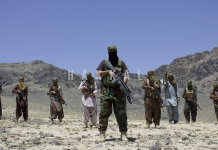Kabul: Two years after the Taliban militarily took control of Kabul, the World Health Organization (WHO) has sounded an alarm over the health and humanitarian crisis that has gripped Afghanistan, saying it is a situation of emergency.
The global body said 28.8 million people in Afghanistan require “immediate” assistance as it noted that millions of people are living with poor or no access to health and food, putting them at a severe risk of malnutrition and disease outbreaks.
“The vulnerability of women and girls has further increased as they faced increased obstacles in accessing healthcare due to the ban on education and workforce participation,” said the revised Afghanistan Humanitarian Response Plan for 2023 launched by WHO yesterday.
It underscored the crucial importance of ramping up investment in healthcare services provision in Afghanistan, particularly in the underserved areas where the healthcare infrastructure is severely under-resourced and remain vulnerable due to the ongoing humanitarian crisis.
The Taliban took control of Afghanistan on August 15, 2021 after a sustained military campaign of months, dethroning an elected liberal government of President Abdul Ghani.
After the military surge of the Taliban began, the US-led international security forces left Afghanistan in a messy manner, leaving the common populace at the mercy of the extremist Islamic militia.
Since then, the Taliban rulers, who have been recognised by only a few countries, have enforced extreme forms of curbs, especially targeted at girls and women, who have been barred even from school and work.
“The vulnerability of women and girls has further intensified, as they face increased obstacles in accessing healthcare due to the ban on education and workforce participation,” the WHO Plan says.
While revealing the alarming situation, the WHO Plan says that to address the health emergency, 14 million people, including 7.5 million children and 3.1 million women, are currently targeted for health assistance, out of which 8.4 million have already been reached in the first six months of 2023.
The healthcare response has been commendable, with a total of 25.7 million healthcare services provided between 2022 and 2023, it said.
“However, despite these efforts and without sufficient funding, 8 million people in Afghanistan will lose access to essential and potentially lifesaving health assistance, and 450,000 patients will have little to no access to life-saving trauma care services, including blood transfusions and referrals,” it said.
In addition, an estimated 1.6 million people with mental health conditions will have little to no access to mental health consultation and psychosocial support, the WHO Alert says.
It highlights the dire consequences that will ensue if underfunding continues in Afghanistan’s healthcare system.
“The health sector is facing significant barriers to delivering holistic services to the Afghan people, especially women and children, resulting in fragmentation and increased vulnerability, particularly in underserved areas,” the world body said.
In his comment, WHO Director General Tedros Adhanom Ghebreyesus said, “The situation in Afghanistan is grave, and the lack of resources and funding to support health workers and facilities is putting countless lives at risk. Women and children are suffering the most.”
He called on donors to give generously so that WHO can continue its life-saving work in Afghanistan.
Dr Ahmed Al Mandhari, WHO Regional Director for the Eastern Mediterranean, urged the international community to unite with WHO to help tackle the ongoing humanitarian health crisis in Afghanistan.
“It is our collective responsibility to act now to support the Afghan healthcare system. The consequences of inaction are catastrophic and may leave a lasting impact on the health and well-being of the Afghan people,” he said.
Dr Luo Dapeng, WHO Representative to Afghanistan, expressed concern about the underfunding of the health system and emphasized the need for immediate action, while also taking the opportunity to extend his appreciation to partners.
“The situation in Afghanistan is critical, and it demands urgent attention. For a country already affected by decades of conflict, underfunding of the healthcare system is a critical humanitarian concern. The consequences of this underfunding cannot be overstated. I want to thank our current partners who have provided support thus far, but also to call on them to redouble their efforts,” Dapeng said.
In the second half of 2023, WHO will continue working with its outstanding partners to tackle critical health emergencies by providing life-saving health interventions, while simultaneously building on the successes observed in 2022, the Plan says.
“Much work still needs to be done to deliver on WHO’s strategic areas; Protecting people every day; Reaching everyone, everywhere, and putting mothers and children first; Leading the health sector by coordinating the health partners, and drive impact in delivering effective health services in Afghanistan,” it says.








